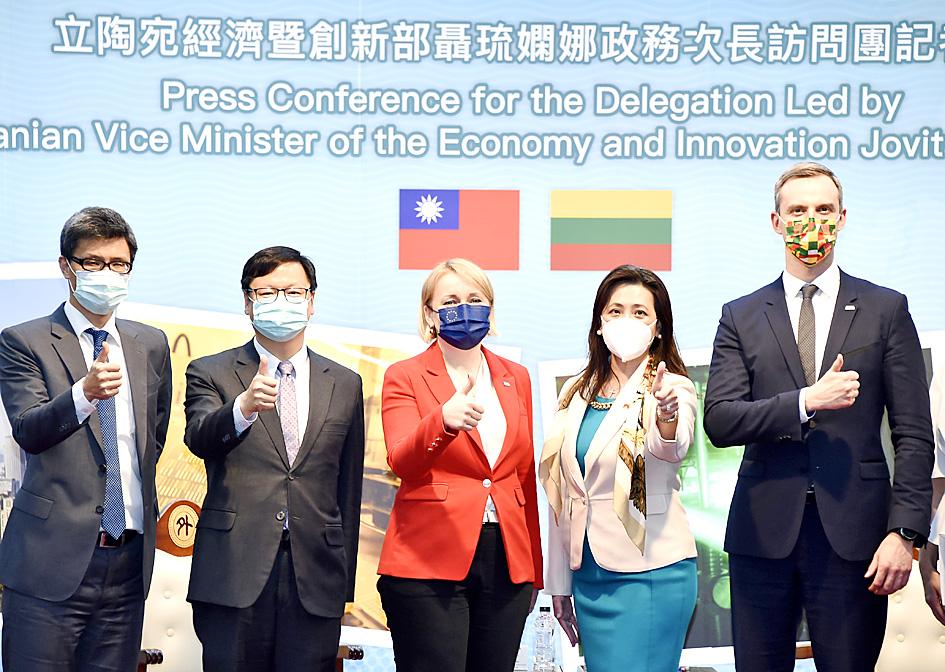Lithuania plans to open a representative office in Taiwan in September, one of its deputy ministers said yesterday, part of a bolstering of ties with the nation that has infuriated China and led to exports falling to almost zero.
Lithuania has come under sustained pressure from China to reverse a decision last year to allow Taiwan to open a de facto embassy in the capital, Vilnius, under its own name.
China has downgraded diplomatic relations with Lithuania and pressured multinationals to sever ties with it, while urging it to correct its “mistakes.”

Photo: Tu Chien-jung, Taipei Times
Speaking to reporters in Taipei, Lithuanian Vice Minister of the Economy and Innovation Jovita Neliupsiene said Lithuania hoped its reciprocal office in Taiwan would open “as of September,” adding that she had scouted out some locations during her visit.
A Lithuanian delegation led by Neliupsiene arrived in Taiwan on Sunday on a four-day visit.
Taiwan has stepped up its food imports from Lithuania — most recently rum — to help ease the impact of Chinese curbs on Lithuanian goods such as beer, dairy and beef.
China had been an important export partner, but Lithuania’s exports to China in the first quarter had fallen to “close to zero,” compared with last year, Neliupsiene said.
“Of course, it’s very painful for certain sectors, for certain businesses and certain parts of the economy,” she said.
However, Neliupsiene said the value of direct exports to China last year — 240 million euros (US$250 million) — could be made up in other markets, such as Taiwan or elsewhere in Asia.
“One of the policies this government, our government, pursues is actually the policy of diversification,” she said. “I do believe that finding good, solid, trusted and reliable partners in Taiwan and in other Indo-Pacific countries will be even more beneficial to us than before.”
Lithuania is a member of the EU, which in January launched a challenge at the WTO, accusing China of discriminatory trade practices against Lithuania and arguing that the move threatens the integrity of the bloc’s single market.
Neliupsiene said a business delegation made up of representatives from the Lithuanian biotech and laser sectors would also visit Taiwan in September.
The Lithuanian government is accepting applications for the first head of the Lithuanian trade office in Taiwan, she told a news conference in Taipei as she wrapped up the delegation’s four-day visit.
Additional reporting by CNA

Sweeping policy changes under US Secretary of Health and Human Services Robert F. Kennedy Jr are having a chilling effect on vaccine makers as anti-vaccine rhetoric has turned into concrete changes in inoculation schedules and recommendations, investors and executives said. The administration of US President Donald Trump has in the past year upended vaccine recommendations, with the country last month ending its longstanding guidance that all children receive inoculations against flu, hepatitis A and other diseases. The unprecedented changes have led to diminished vaccine usage, hurt the investment case for some biotechs, and created a drag that would likely dent revenues and

Global semiconductor stocks advanced yesterday, as comments by Nvidia Corp chief executive officer Jensen Huang (黃仁勳) at Davos, Switzerland, helped reinforce investor enthusiasm for artificial intelligence (AI). Samsung Electronics Co gained as much as 5 percent to an all-time high, helping drive South Korea’s benchmark KOSPI above 5,000 for the first time. That came after the Philadelphia Semiconductor Index rose more than 3 percent to a fresh record on Wednesday, with a boost from Nvidia. The gains came amid broad risk-on trade after US President Donald Trump withdrew his threat of tariffs on some European nations over backing for Greenland. Huang further

Nvidia Corp’s GB300 platform is expected to account for 70 to 80 percent of global artificial intelligence (AI) server rack shipments this year, while adoption of its next-generation Vera Rubin 200 platform is to gradually gain momentum after the third quarter of the year, TrendForce Corp (集邦科技) said. Servers based on Nvidia’s GB300 chips entered mass production last quarter and they are expected to become the mainstay models for Taiwanese server manufacturers this year, Trendforce analyst Frank Kung (龔明德) said in an interview. This year is expected to be a breakout year for AI servers based on a variety of chips, as

HSBC Bank Taiwan Ltd (匯豐台灣商銀) and the Taiwan High Prosecutors Office recently signed a memorandum of understanding (MOU) to enhance cooperation on the suspicious transaction analysis mechanism. This landmark agreement makes HSBC the first foreign bank in Taiwan to establish such a partnership with the High Prosecutors Office, underscoring its commitment to active anti-fraud initiatives, financial inclusion, and the “Treating Customers Fairly” principle. Through this deep public-private collaboration, both parties aim to co-create a secure financial ecosystem via early warning detection and precise fraud prevention technologies. At the signing ceremony, HSBC Taiwan CEO and head of banking Adam Chen (陳志堅)